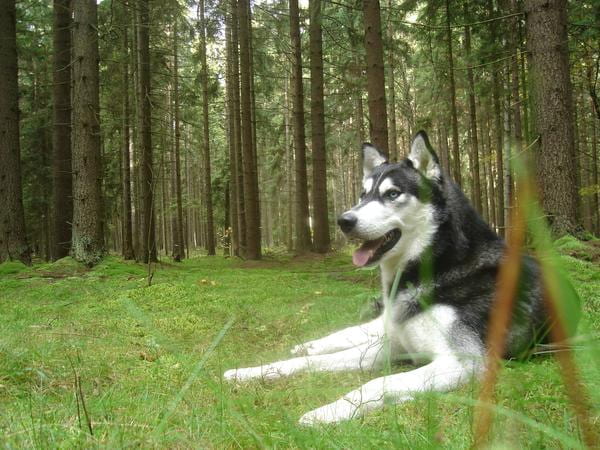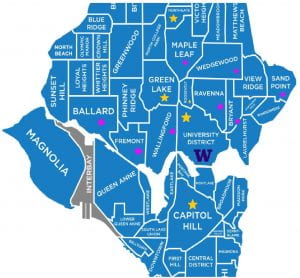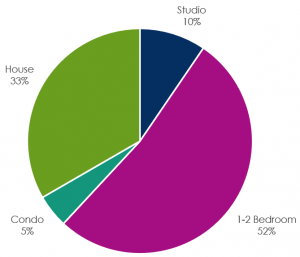We’ve collected some Things To Do here.
Where do we live?
Let’s be honest. We are scientists and we like to see numbers and charts… just admit it.
Polling random Chemistry graduate students we found:
Top Lived in Neighborhoods:
- University District
- Roosevelt
- Northgate
- Green Lake
- Capitol Hill
Honorable Mentions:
- Wallingford
- Fremont
- Ballard
- Ravenna
- Maple Leaf
- Wedgewood
- Bryant/Laurelhurst
- Sandpoint (Magnuson Park)
What’s so great or not so great about your neighborhood?
University District
“The U-District is so close to campus and within walking distance to Green Lake and lots of other parks.”
“Accessibility to grocery stores, restaurants, and campus”
“Ease of access to campus and lots of things in walking distance”
“Multiple bus lines close by”
“Undergrads abound”
“The undergrads get noisy”
“Alleys are dirty from people rooting through the trash”
Roosevelt
“Lots of nice walkable side streets and cute cafes around”
“Cute neighborhood to walk through, you can even walk to campus”
“It’s pretty cheap and near campus and bus stops”
“An easy commute”
“It’s really hard to travel east to west on the bus from here. You need to either walk or drive if you don’t want to be on the bus for an hour.”
“It’s pretty residential, far from some of the funner spots”
“There isn’t a whole lot going on”
Northgate
“It’s quieter than the U-District, Capitol Hill, or Downtown”
“Close to the mall, Target, and a grocery store”
“Our apartment is right on the 67 bus line to campus”
“Great green space and beautiful houses and gardens to look at here”
“Hard to get to Green Lake and Greenwood by bus; it requires a transfer and about an hour”
“There are a lot of loud kids in my apartment complex”
“There are not enough bars for young, broke people up here”
Green Lake
“It’s close to a lake”
“Being walking distance from the lake is nice for picnics or a relaxing afternoon in a hammock”
“The path around the lake is about 2.8 miles, so it’s a nice distance for jog”
“There is a lot of traffic in some spots”
“It gets expensive”
Capitol Hill
“Good restaurants”
“It gets noisy”
Wallingford
“I love so much about Wallingford! The best part is easy access to lots of different places [via walking/buses]”
“In Wallingford, the houses are close together”
Fremont
“We live within walking distance to grocery stores, restaurants, and bars”
“If you don’t have an assigned spot with your lease, parking can be hard to find”
Ballard
“So many great restaurants and breweries”
Ravenna
“Ravenna Brewing is within walking distance”
“It’s close to campus”
“It gets boring, feels like suburbs”
Maple Leaf
“It’s residential but there are still tons of bars and restaurants”
“Easy access to the 67 bus line”
“We love our yard”
Bryant/Laurelhurst
“Quiet and close to grocery stores”
“Not many graduate students live out this way”
Sandpoint (Magnuson Park)
“Access to Lake Washington and tons of space for my dogs”
“There aren’t a lot of restaurants/bars/coffee shops within walking distance”
What’s the commute like?
With most graduate students taking the bus, we asked which lines.
They said:
- 67 (31.6%)
- 372 (15.8%)
- 44 (15.8%)
- 45 (10.5%)
- 32 (10.5%)
- Link Light Rail
- 65
- 75
What kind of homes do we live in?
- 76% of graduate students we asked live with roommates/housemates.
- 58% of those students knew their roommates before moving in.
- 30% didn’t but used resources like the UW roommate finder, etc.. to find them.
- 12% knew at least 1 of their roommates before moving in.
How much should you expect to pay in rent/utilities?
On average, graduate students pay between $600-$1500 in rent. This of course varies wildly between neighborhoods, sizes of places, and the number of people you live with. Bottom line is you can make what you need to work, but having housemates will usually end up being cheaper.
For utilities we see another range of between $50-$200 depending on if any utilities are included in rent. Most places water/sewage/gas are lumped together and you either pay a flat rate or per your square footage. Internet ranges between $30-$150 depending on speed and if you need TV/phone. In Seattle, electricity comes through Seattle City Light and you are charged every two to three months. Keep this in mind when budgeting! (It has gotten the best of us)
Okay, so what is really a “deal breaker” when it comes to finding a place?
“Easy commute to UW, any place that came with a bus transfer was out”
“If you have a car, you really want assigned parking. Street parking can be horrible.”
“I didn’t want to live too close to undergrads”
“A washer/dryer in unit or access to a clean, well-lit, shared washer/dryer in the building”
“You need an oven. And probably a dishwasher.”
“Pay attention to how you are being billed for utilities, if it is by unit you can control it, but if it is by square footage or flat rate, you can’t.”
“Pet friendly”
“Affordable for 1 person”
“An outdoor space”
Our final parting words:
“Don’t house search too early (Washington state is 30 days notice of intention to vacate), but do house search aggressively. Most places are snapped up within a week of being on the market.”
“There are many resources for finding a place (apartments.com, craigslist, etc) but ask someone to walk by look at it for you if you can’t see it before moving in”
“It’s so important to be on a good bus line (chances are if you are on a line to campus, some of your friends live along that line too). This is obviously important for school but also very important for socializing!”
“Be careful and pay attention to the square footage, Seattle has lots of micro studios”
“The housing market moves fast, take a place right away if you like it”
“Each neighborhood has it’s own personality but it’s hard to get a good feel for them without being here for a little bit first.”
“Some places get far or hard to reach without a car depending on where you live, but a car is still not a necessity and finding someone with one is a good way to make a new friend!”
“You may think you can handle it, but you REALLY don’t want to live in a basement apartment. You and your plants need natural light.”
Information as of Summer 2020. Interested in helping us update? Email chemgrad@uw.edu
For some more information:
- Google Doc with resources on finding housing in Seattle (courtesy of UW Chem Mentoring)



